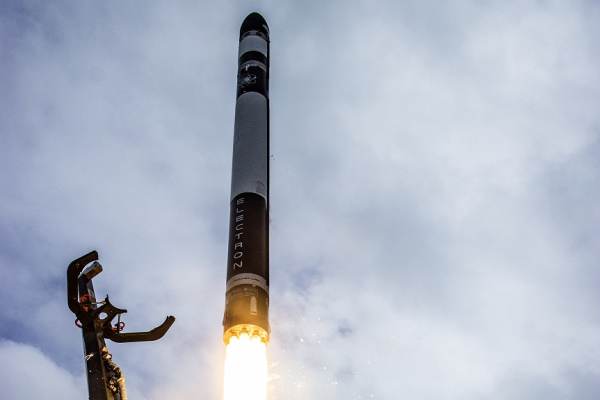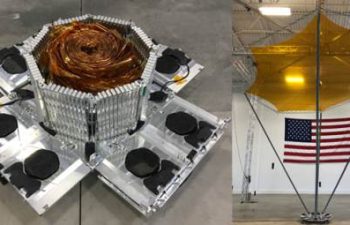Published on the 05/04/2019 | Written by Jonathan Cotton

Launch of DARPA tech raises questions about military payloads and the internet of the future…
Taking off from Mahia Peninsula last Friday was Rocket Lab’s 25th satellite, providing more evidence that the New Zealand/California-based aerospace operator may just be the little satellite launcher that could.
So far, Rocket Lab’s payloads have been nothing if not diverse – weather monitoring, Earth observation and internet of things tech included. This launch – the first of 2019 – was different however, packing an experimental antenna payload – property of the US Government.
[CONTINUES BELOW]
Launched via the single use 150kg Electron rocket (at a reported cost of US$5.7m per launch), the antenna, made of tissue-thin membrane and packed tightly inside the small onboard satellite, will deploy to low orbit where it will unfurl itself to its final 2.25 metre form.
The package is known as the Risk Reduction Deployment Demonstration – or ‘R3D2’ for short – a payload put into orbit on behalf of none other than the Defense Advanced Research Projects Agency, better known as DARPA.
[It] could revolutionise global communications by laying the groundwork for a space-based internet.
It’s a far cry from last year’s launch of an orbiting art piece called the Humanity Star, but Rocket Lab is no stranger to big-name contracts – last year the company secured a contract with NASA launching 13 CubeSats – or the militaristic end of the market.
While Rocket Lab isn’t labouring the military connection, it’s definitely a new step for the Huntington Beach, California-based company. This is DARPA after all, the big brains behind all those unsettlingly naturalistic robots, a host of cutting edge military tech, and, according to the some, the foundations of the very internet itself.
 That last one is a key area of interest for DARPA. The payload onboard this latest launch is technology designed to help validate the idea of a ‘data transport layer’ in low Earth orbit, which could ultimately lay the groundwork for a ‘space-based internet’.
That last one is a key area of interest for DARPA. The payload onboard this latest launch is technology designed to help validate the idea of a ‘data transport layer’ in low Earth orbit, which could ultimately lay the groundwork for a ‘space-based internet’.
DARPA isn’t sharing all the details. but a satellite-assisted space-based internet might not be as remarkable as it first sounds. Elon Musk says he’s got plans to create just such a thing, with SpaceX having already received the okay from the FCC to launch ‘thousands’ of low Earth orbit satellites for that reason. Musk’s proposed system would see data transferred from the ground to satellites above via radio, beamed from satellite to satellite via laser, before being returned to earth via radio wave. Such a system could conceivably operate twice as fast as optical fibre transfer on Earth.
It’s a growth industry and the market is set to get crowded, fast. Last week, OneWeb, a space-based internet startup backed by billionaire Richard Branson and others, launched its first six satellites, the first step in a planned ‘constellation’ of 650.
The successful launch, said Adrian Steckel, CEO of OneWeb, is “the first step towards… bringing much-needed Internet access to people no matter where they are.”
The company says that ultimately it hopes to offer “a coverage footprint over the entire planet, including previously unconnected rural areas, seas and airspaces” and providing “significantly lower latency and faster speeds”.
Low earth orbit is rapidly becoming a contested space. With its new slogan, “Frequent and reliable launch is now a reality”, Rocket Lab is likely hoping its speed-to-market will help differentiate in an increasingly competitive environment.
“The unique requirements of this mission made Electron the perfect launch vehicle to lift R3D2 as a dedicated payload to a highly precise orbit,” says Rocket Lab founder and CEO Peter Beck.
“We look forward to continuing to provide frequent, reliable and rapidly-acquired launch services for innovative small satellites.”
From start to finish the R3D2 launch mission took just over 18 months. That short turnaround is of central interest to DARPA, as the research agency seeks to establish just what the fast-to-launch, low cost capabilities of the commercial market mean to the US Department of Defence and others.
“This mission could help validate emerging concepts for a resilient sensor and data transport layer in low Earth orbit,” says Fred Kennedy, director of DARPA’s Tactical Technology Office, “a capability that does not exist today, but one which could revolutionise global communications by laying the groundwork for a space-based internet.
“The Department of Defense has prioritised rapid acquisition of small satellite and launch capabilities… By relying on commercial acquisition practices, DARPA streamlined the R3D2 mission from conception through launch services acquisition.”
It’s an opportunity for the taking. New Zealand’s progressive regulation, including 2017’s Outer Space and High-altitude Activities Act, along with Rocket Lab’s early successes has gone a long way to establishing New Zealand’s credentials as a commercially viable, internationally recognised space economy.
Morgan Stanley this week highlighted Rocket Lab as a being among the best positioned space companies to take advantage of the smaller private satellite launch market.
There’s certainly money to be made and as Rocket Lab and New Zealand’s space capabilities grow, the company will need to learn to navigate the murky PR waters that accompany defense contracting. And that will surely come up: Lockheed Martin, the world’s largest defense contractor, is, after all, a key investor.
Beck has stated on numerous occasions that “Rocket Lab was founded on the principal of opening access to space to better understand our planet and improve life on it.” It’s a good place to start, but as Google has shown, growth can put those idealistic mantras – even such seemingly unambiguous ones as ‘don’t be evil’ – to the test.
Rocket Lab’s securing of lucrative foreign government contracts and successful launches is surely cause for celebration. But as the industry grows, and as space and its growing infrastructure becomes increasingly contested, it will be interesting to see how this commitment to noble principles evolves.
Images courtesy Kieran Fanning and Sam Toms



























